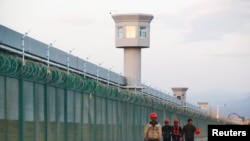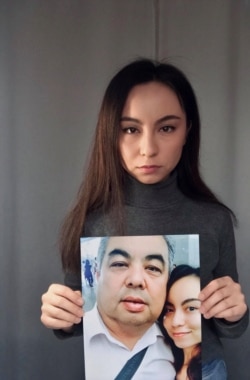A young Uighur woman in Boston is harnessing the power of social media to raise awareness about the plight of her people in China’s Xinjiang region, including her father who has been held in a so-called Chinese re-education camp for two years.
Samira Imin, 27, is reaching out to thousands of people on social media platforms such as Twitter to share stories about her 54-year-old father, Iminjan Seydin, who went missing in 2017 in the predominantly Uighur region of Xinjiang.
Imin told VOA that she recently learned from her friend in Beijing that her father was sentenced to 15 years imprisonment for a book that he had published three years before his arrest.
“My father was sentenced with a trumped-up charge of ‘inciting extremism’ after being detained and put in ‘re-education through transformation camps’ for two years,” Imin told VOA, adding that the book, titled A Teacher of Arab Tongue, the Science of Rhetoric, was an Arabic language learning book he published in 2014 after obtaining government authorization.
Before his arrest in mid-2017, Seydin was a full-time professor of Chinese history at the Xinjiang Islamic Institute in the region’s capital Urumqi. At the same time, he owned a publishing organization called the Imin Publishing House, which since its foundation in 2012, had printed nearly 50 books on topics such as language, education, technology and psychology.
In Imin’s opinion, her father, “a very liberal and advanced thinker,” is not someone who should be a target for “re-education.”
“It’s shocking. My father is never against China and he is a highly educated individual in the Uighur community. Besides being a university professor, he is also a book publisher and published books, to name a few, such as Seven Habits of Highly Effective People and The Willpower Instinct in the Uighur language,” she told VOA.
Losing Contact
As a millennial growing up in Urumqi, Imin was educated in Chinese through kindergarten to high school. After she had finished high school and began college education in Nanjing in eastern China, her father Seydin encouraged her to pursue her dream of obtaining medical education in the U.S.
“Sending me to Chinese school instead of Uighur one was my parents’ choice in the hope of making me a well-rounded person in a society where Chinese population has grown exponentially,” Imin told VOA.
Imin came to the U.S. in 2014 as an international student and was admitted to the University of Massachusetts Amherst (UMass Amherst) majoring in biology. During that time, she kept in touch with her family mostly through Chinese social media app Wechat.
“I was still able to contact my father even on his birthday in April 2017. He sent me pictures celebrating his birthday with his colleagues from a rural village in Hotan where he had been sent to work for a year under Xinjiang government’s mandatory rural village work program,” she said.
Seydin was expected to finish the obligatory rural work and return to his home and permanent workplace in Urumqi in the summer of 2017. But he was suddenly arrested in May when Chinese officials were stepping up a new policy of crackdown against Uighurs and other Muslim minorities in Xinjiang.
“He didn’t come back as I was expecting. Then I asked my family where my dad had been. They just simply said, ‘the rural work program had been extended for another three years. I just believed them because we don't have this trust issue in our family. And plus I had trusted my country and I kept believing and then I was busy with my school,” Imin said.
Imin’s mother and younger brother are currently residing in Urumqi. She said she is unable to raise her father’s case with them because of security concerns.
The exiled Uighur woman graduated UMass Amherst in 2018, saying she was much heart-broken not to have her family beside her during the graduation ceremony. The Chinese government by then had taken away her parents’ passports, like thousands of other Uighurs, to prevent them from traveling.
“I began working as a medical professional at Harvard Teaching Hospitals after graduation. There was not a single day that went by without thinking about my father and how he was doing. I had to consistently deal with my own emotional pain of not knowing what happened to him, every single day,” she said.
Social media activism
After hearing from a friend in Beijing in November that his father has been sentenced to 15 years, Imin became outspoken and active on the Internet, talking to media in the hope of pressing Chinese officials into his release.
“I wasn't too active until I found out specifically about my father's case. And I'm active on social media to ask for freedom and justice for my father,” she said.
Like hundreds of Uighur diaspora members, she says social media is the only way to fight for her family and expose the grave condition of her kin in China.
While rights groups say Chinese government has strictly controlled the online medium in Xinjiang, Uighur activists continue to use social media platforms to advocate for their people. A 40-second video by a U.S. teenager condemning China’s policy against the Uighurs on the Chinese-owned social network TikTok went viral last November. The videos, which were disguised as makeup tutorials, received millions of views.
Since 2017 China has been accused of detaining almost 1.8 million Uighurs and other minority Muslim groups in mass incarceration camps where they are allegedly forced to abandon their religion. Those outside the camps are believed to be under strict government surveillance with no access to the outside world.
According to Uyghur Human Rights Project, a Washington-based group, as many as 338 Uighur intellectuals are among those missing or confirmed arrested.
Officials in Beijing deny the accusations and say their efforts are to eliminate the “three evils: extremism, terrorism and separatism.” Chinese authorities recently said they have released all the “students” from “re-education vocational training,” a name China prefers to use for the camps.
Some researchers and human rights organizations, however, have charged that China has switched its detainees from the camps either into prisons with lengthy jail sentences or factories where they are forced to work for minimal wage and return home on weekly basis.





